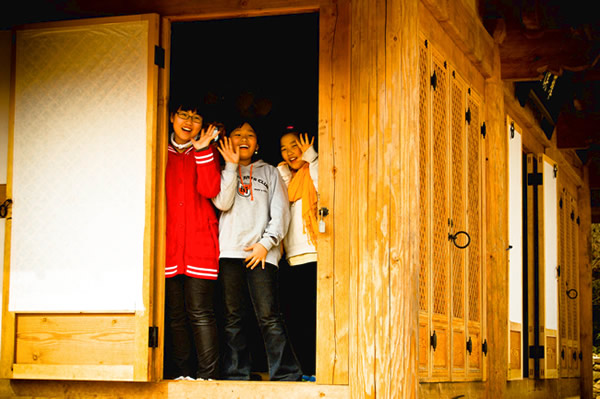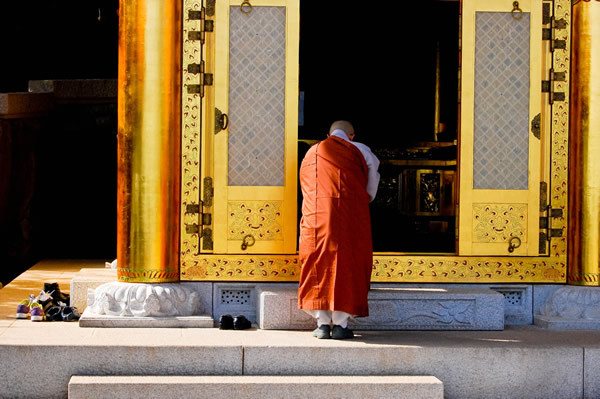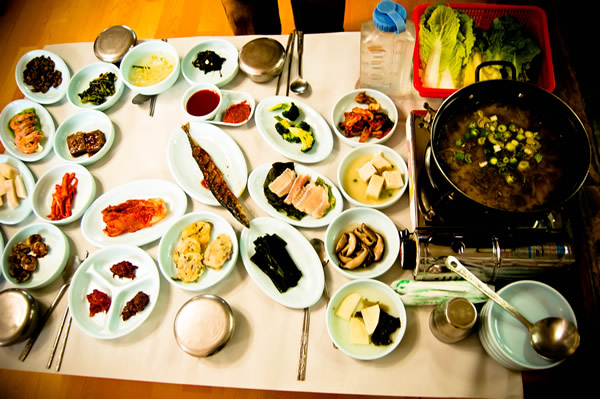Living and Teaching in Korea
A Different Pace of Life
Article and photos by Lindsay Nash

The World Cup Stadium in Gwangju, South Korea, is sparsely packed with families and fans. The crisp spring morning is as cool and quiet as the country's nickname — “Land of the Morning Calm.”
I pull my warm hat over my ears and stretch my legs. Ten minutes until start time. Looking around, I am the only white face in a sea of beige. But at this moment, no one notices. I look at the clock. Five minutes.
A man's voice echoes and cracks through a loudspeaker, rallying the runners before this annual marathon that has attracted hundreds of athletes to this city in the south of the peninsula. I do not understand what the announcer is saying, but I can tell he is excited. All of a sudden, I feel hands on my back, rubbing, pounding, and loosening the tenseness. All around me, it is an assembly line of hands rubbing shoulders. I timidly reach out to the middle-aged man in front of me.
Ten seconds. I re-tie the double knot of my Brooks Adrenalines and jog in place.
Suddenly, a gun fires somewhere in front of me and the sky is instantly a cacophony of fireworks, balloons and blitz. Bright-colored balloons float wistfully between sparks of light above our heads as we start our slow lumber out of the starting line chute.
"Hwaiting!" the people shout. Fighting! Thick crowds of Koreans line the street, clapping and cheering their friends and family members. I round the first corner of the half marathon course, settling into what might be a long 13 miles.
Why Go to Korea?
I have been in Korea for almost a year now teaching English to elementary school children. It is a popular job, attracting nearly 20,000 native English speakers every year.
The jobs pay a good salary (starting at 2 million Korean won a month), and always offer free housing and flights. It is a job where you can easily save at least $500 a month and travel Asia in your free time. I cannot tell people back home enough: Have an unabated bout of wanderlust? Go to Korea.
To be honest, I never imagined myself here. How could I? Running toe-to-toe with a Korean middle-aged man who keeps looking at me and grinning. It is a bit uncomfortable adjusting to his presence. I wish he would just pass me, I think as I head up the first hill of the half marathon course.
The Decision to Move
When my husband and I first thought about living abroad, we looked at the usual hotspot destinations: Thailand, South America, and Japan. We were looking for anywhere for something other than an American 9-to-5 desk job. We needed something more: Adventure. Spice. Strange souvenirs we could hang on the wall. Stories to pass down to generations of grandchildren. And more than that, we needed perspective to better understand our own country and our own place in the world.
But, as two late twenty-somethings trying to pay off our early twenties, we also needed money. It took exactly 0.27 seconds for Google to return with 369,000 versions of the same answer: South Korea.
My middle-aged Korean man friend is still running beside me as we head through the last main intersection on the fringes of the city. Behind us, tall, monolith white concrete apartment buildings sit stoically between green and brown and gray craggy peaks. Buses burn through red lights. Smartly-dressed women in high heels and tight skirts natter on cell phones at bus stops. Men in black business suits smoke as they hurry down cracked sidewalks. In every Korean city, it's the same: bali bali! Fast. Fast.
Ahead, there is nothing but rice paddies and the slow work of bent ajummas (older women) beneath straw hats in the fields under the morning sun. Flat fields abound in every direction, only interrupted by abrupt gray mountains in the distance.
I am now growing accustomed to my running partner. My breathing is finally tuned to his, my pace to his, his strides to mine. He speaks little English. I speak little Korean.
"Pacemaker," he says, smiling, pointing to himself, then to me. "Hanna! Tulle! Hanna! Tulle!" One! Two! One! Two! He says as we pound our way up one of the many hills.
Living in Korea
Korea is a beautiful country, especially when you step outside the cities and their ubiquitous concrete. The mountainous landscape was once described as the worst aspect of the Korean War by Lieutenant Colonel George Russell. "On the other side of every mountain [was] another mountain," he said.
But the war is long over and the mountains are truly embraced by Koreans. Gore-Tex-clad hikers trek up and down the myriad trails every weekend, swinging their arms up and down, their black metal hiking sticks clicking, clacking on rocky underfoot.
Korea is a country and culture worlds apart from America. It is almost completely homogenous, which means it's not easy being green, white, black or any blend of colors. It is a rare day when I don't get a pointed finger in my face with the usual "Oh-ma!! Waygukin!" Mom, a foreigner!
It is also one of the most wired countries in the world. internet access abounds on every street block in the popular PC bangs. Korean men in suits and teenagers in T-shirts and ratty, faded jeans sit side-by-side, smoking cigarettes and drinking grape soda while high-kicking and shooting fictional foes.
It is a country where postcards are rare, a real sign that you are somewhere off the tourist grid.
Buddhism and Confucianism still persist in this country where education is the highest priority and gray-cloaked monks live in peace and serenity in hidden mountain temples. Young Koreans are quick to give up their seat on crowded buses for a sonsaengnim. In Korean culture, this word is not only used to address teachers, but anyone older, and therefore wiser.

It is a country where the food is spicy and the alcohol fiery. From the spicy kimchi to sweet red-bean soup, the food is healthy and hearty; the side dishes, banchan, always a beautiful mosaic of reds, greens, yellows, oranges, and browns.

It is a country that most days seems eccentric, from the quirky ajummas power walking around ponds to the youth who spend six days a week at school.
But that is what makes everything so interesting here. It is everything I am not. Everything America is not. And I am willing to try anything, and everything, at least once.
Sometimes I still have to pinch myself and remind myself that this is real. This man running beside me. My students at school. The woman in the corner market who always gives me free sardines and face masks. The jolly Korean woman who loves to pinch my cheeks when I walk into her restaurant. The woman at the bakery on the next block, always leaning her head on her elbows at the counter and staring out the window, who always accepts our mailed packages from America when we are not home. And my Korean friend's mother who calls me on a weekly basis. "Lindsay! Kimchi?" And within 10 minutes, she's at my front door with another Tupperware of spicy cabbage and a motherly smile.
Kindness in Korea
The people are kind to a fault. Koreans are the kind of people who will go to the ends of the world for you — whether they are helping you find a destination across town or fixing your broken heater.
My pacemaker and I are now running through a small village in the countryside, just past the halfway mark on our route to the finish line. We approach a water table. He runs ahead, fills my cup, and brings it back to me. We lose no time.
We come upon a small crowd slightly confused at the mass of blurred spandex. He points to me and smiles at the crowd. "Migukin! Annyong!!" Say hello to the American, he proudly shouts as we pass. They wave and cheer, happy to have me in their small corner of the world.
"Pacemaker," he says again to me, smiling at his new role in my race, in my life. I return the smile, thankful for the companionship on this long journey.
We slip into an easy silence, our legs and bodies tiring as we near the end of our thirteen miles. The pounding of our feet and the rhythm of our strides becomes our conversation.
Before I know it, I am within sight of the World Cup Stadium. "Lindsay Teacher!!!" I hear from the sidelines as I enter the stadium. Two young girls catch up to me, screaming gleefully for their teacher. They pick up my quickened stride. And together, my two young students, my pacemaker, and I stride through the finish line.
I hug my students and turn to my new friend.
"Kamsa hamnida." Thank you. He smiles in response and shakes my hand.
We are now more than our stereotypes suggest: one waygukin, one Korean. We are simply two runners with more in common than we thought. Starting with the identical shiny medals now strung proudly around our necks.
Tips for Respecting South Korean Life and Culture
- When visiting temples, homes, restaurants or guest houses, always remove your shoes at the door. Wearing socks or stockings is more polite than bare feet.
- Dress conservatively. Casual clothing is fine in most situations. In hot months, men rarely wear shorts.
- When visiting someone's home, bring along a small gift. Fresh fruit or boxed Spam (really!) or tuna sets are always appreciated.
- When paying, always use your right hand, with your left hand placed politely on the inside of your right elbow.
- When receiving a gift or business card, always accept with two hands.
Resources for Teaching in Korea
English Program in Korea (EPIK) is a Government program that places teachers in public schools in Korea. A trusted source for job placement in Korea's public schools, accessible through Korvia and other agencies.
Footprints Recruiting is a Canadian recruiting firm offering jobs teaching English in South Korea.
Templestay. Want to do a temple stay? Visit this site to read about Korea's participating temples, including those that offer English translation. An overnight stay at a centuries old temple offers a true glimpse into Korean Buddhism.
Lonely Planet Korea is the essential guidebook for Korea, is a must if you are planning on traveling or living in Korea. It offers the details you need, from the best hotels and restaurants to off-the-beaten-path must-sees. |
Lindsay Nash is an American living and teaching in Gwangju, South Korea. She is a former newspaper reporter who now spends her time teaching English to elementary school children and doing freelance photography and writing.
|
